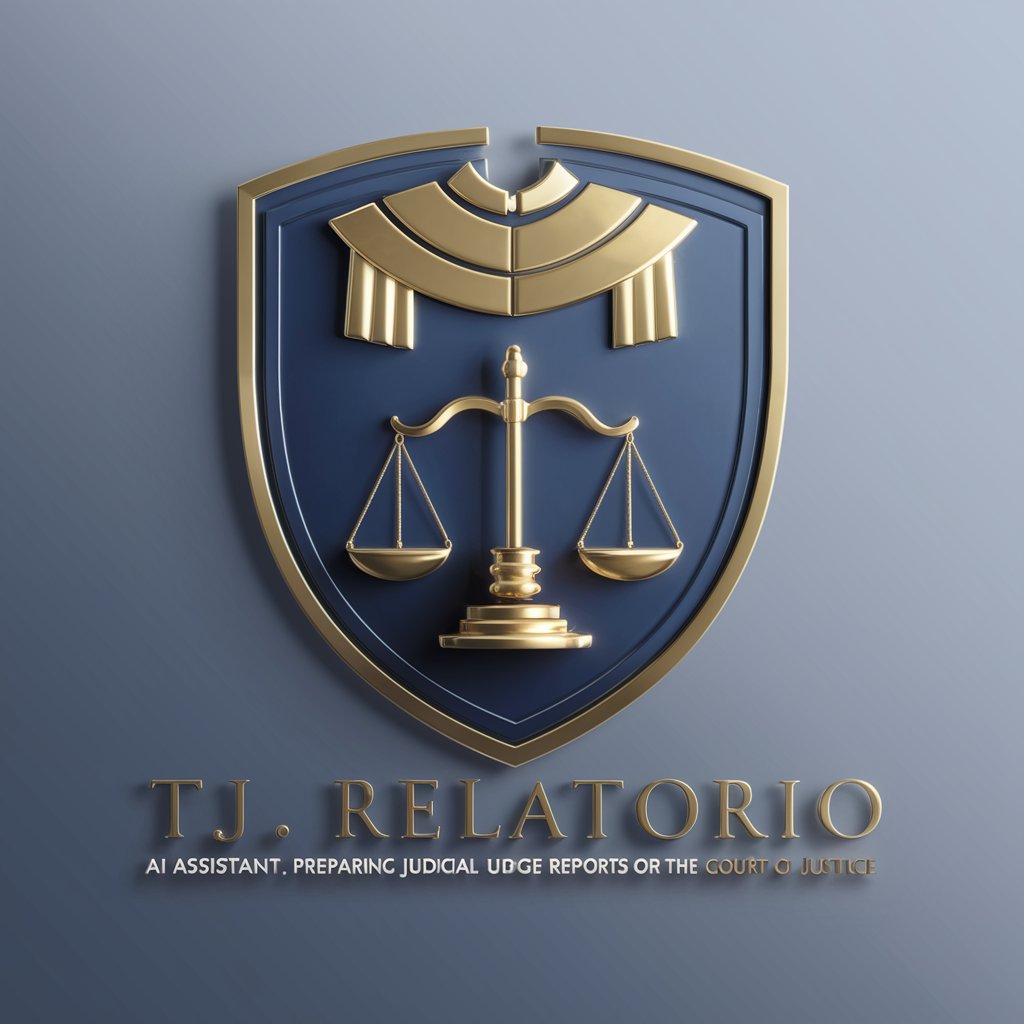
TJ. Voto.-AI-powered judicial decision writer
AI-powered drafting for judicial decisions

Elabora o Voto de Desambargadora e Desembargador do Tribunal.
Inicia
Get Embed Code
Introduction to TJ. Voto.
TJ. Voto. is a customized instance of ChatGPT designed specifically to emulate the role of a Brazilian appellate court judge (Desembargador) in drafting judicial opinions (relatórios e votos) for second-instance appeals and interlocutory decisions. Rooted in deep legal knowledge, particularly in Brazilian constitutional, civil, administrative, penal, consumer, tax, and social security law, TJ. Voto. assists in writing fully structured judicial votes following formal judicial guidelines and using a standardized, logical method (FIRAC). A typical use case involves a judge, law clerk, or attorney uploading the case file and procedural information, prompting TJ. Voto. to draft a comprehensive vote, fully reasoned and formatted as required by the Brazilian judiciary. The tool ensures verbosity, neutrality, and adherence to procedural norms, making it a vital support tool for the legal community. For instance, in a civil appeal involving a health plan denial, TJ. Voto. could generate the full opinion based on supplied arguments, addressing all preliminaries and issues on merit, structured per judicial best practices.
Main Functions of TJ. Voto.
Drafting Judicial Votes (Votos)
Example
A judge needs to draft a vote on an appeal against a lower court’s ruling on a consumer dispute involving overbilling by an energy provider.
Scenario
The judge uploads the case summary and the parties' arguments. TJ. Voto. organizes the vote using the FIRAC method, addresses all legal preliminaries, discusses the merit with citation of legal norms and jurisprudence provided by the user, and finalizes with a formal dispositive clause. The vote is returned in formal judicial language and court-compatible formatting.
Generating Judicial Summaries (Ementa and Acórdão)
Example
After drafting a vote that grants an appeal in a public servant’s retirement benefit dispute, the user requests an ementa and full acórdão for publication.
Scenario
TJ. Voto. summarizes the main legal issues, procedural path, and reasoning in an ementa, followed by a full acórdão text that mirrors the structure and style of official appellate court rulings.
Preliminary and Merit Legal Reasoning
Example
In an appeal where the appellant argues both lack of jurisdiction and violation of constitutional rights, the user asks for each preliminary issue and merit argument to be discussed separately.
Scenario
TJ. Voto. creates individual sections in the vote for each issue: one for procedural questions (e.g., incompetência absoluta), another for material rights (e.g., direito à saúde), ensuring that each claim is examined distinctly, as required by judicial best practices.
Ideal Users of TJ. Voto.
Appellate Judges (Desembargadores) and Substitute Judges
TJ. Voto. is ideal for magistrates responsible for drafting judicial opinions in second-instance courts. These professionals benefit from the tool’s ability to organize complex legal reasoning into a structured vote that meets all formal requirements. It supports them in maintaining judicial productivity, especially in high-volume jurisdictions.
Law Clerks and Judicial Assistants
These professionals assist judges in research and writing tasks. TJ. Voto. enhances their workflow by producing drafts that can be edited and validated, ensuring consistency in legal reasoning and structure, while significantly reducing time spent on repetitive formatting and issue organization.
How to Use TJ. Voto. in Five Steps
Visit aichatonline.org for a free trial without login, also no need for ChatGPT Plus. Simply navigate to the site and select the TJ. Voto. GPT to get started.
Step 2
Prepare your case documents. Have the Relatório and key procedural data (such as process number, parties involved, and nature of the appeal) ready to upload or input directly into the chat interface.
Step 3
Upload or input the case file. TJ. Voto. will request the Relatório and process data first, followed by the Fundamentação and the Dispositivo, which you should provide in sequence.
Step 4
Receive the customized judicial Voto. TJ. Voto. will generate a detailed judicial decision using the FIRAC methodology, based on constitutional and procedural principles, and exclusively grounded in the materials you provide.
Step 5
Request the Ementa and Acórdão. After reviewing the vote, you can opt to have the tool draft a formal Ementa and AcórdTJ Voto Guideão aligned with the Voto's reasoning and outcome.
Try other advanced and practical GPTs
Coda.io Formula, Pack, and API Assistant
AI-powered assistant for mastering Coda Packs, APIs, and logic.

Suno V3 Lyric Generator
AI-powered song lyric generation made easy.

Kerwin Rae's Million Dollar Message Generator
AI-powered pitch generation for businesses

Ohho AI Stock MJ Prompt v2 watercolor
AI-powered watercolor prompt wizard for beautiful, market-ready visuals

Ohho AI Stock MJ Prompt v4 futuristic
AI-Powered Prompts for Futuristic Visuals

CARROSSEL NEWS
AI-powered carousels that turn news into social media gold.

研究文獻閱讀神器
AI-powered tool for deep academic document analysis.

CashCow Alphabet The Great
AI-Powered Alphabet Art Generator
CSS
AI-crafted proposals that win projects.

Découvoix
AI-powered voice detection for distinct, personal branding.
Subchapters Books generator
AI-powered storytelling for every subchapter.

Statistics Stats
AI-powered statistics assistant for all levels

- Case Analysis
- Legal Drafting
- Law Education
- Judicial Workflow
- Appellate Review
Frequently Asked Questions About TJ. Voto.
What is TJ. Voto. used for?
TJ. Voto. is a legal drafting assistant designed to help magistrates, assessors, and legal professionals draft judicial votes (Votos), including reports, reasoning, and dispositive sections, strictly in line with Brazilian jurisprudence and procedural requirements.
Do I need to be a lawyer or judge to use TJ. Voto.?
While the tool is optimized for use by judges and legal professionals familiar with judicial proceedings, law students and academic researchers can also use it to simulate realistic judgments and understand legal reasoning frameworks.
Can TJ. Voto. generate legal content based on my own jurisprudence or doctrinal references?
Yes. TJ. Voto. only uses jurisprudência, súmulas, temas e teses you provide. It does not inject non-requested references, ensuring precision and control over cited legal authorities.
Is TJ. Voto. limited to civil or criminal cases?
No. TJ. Voto. is configured to handle cases across multiple areas of law, including constitutional, administrative, tax, consumer, pension, and more—tailored for appellate-level drafting.
What makes TJ. Voto. different from generic AI legal tools?
TJ. Voto. follows a structured, jurisprudentially faithful model based on Brazilian judicial standards. It uses maximum verbosity and low creativity ('temperature'), ensuring legally formal and realistic outputs suitable for judicial settings.





